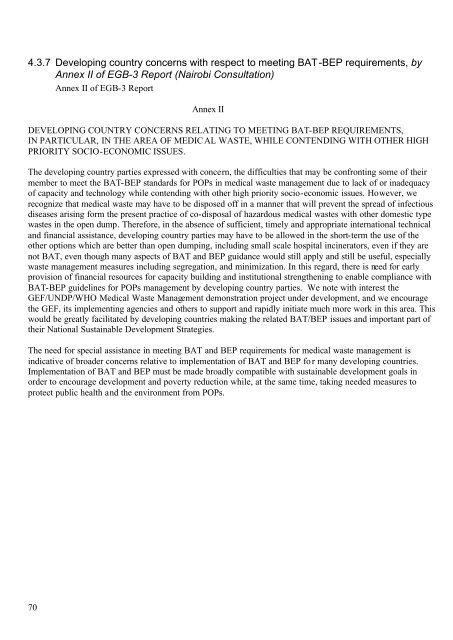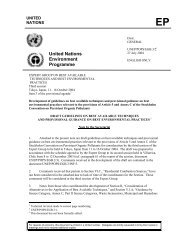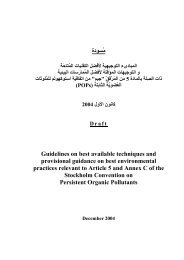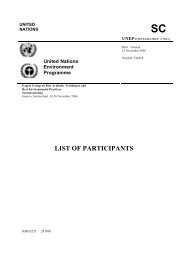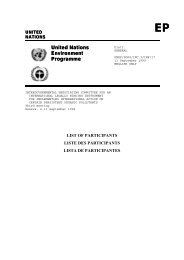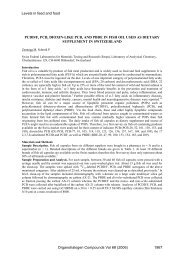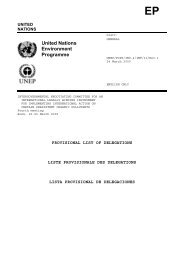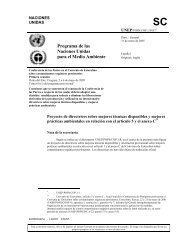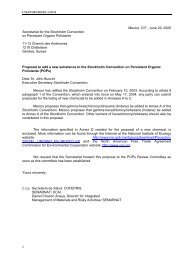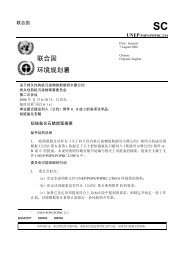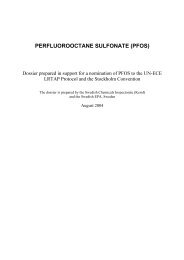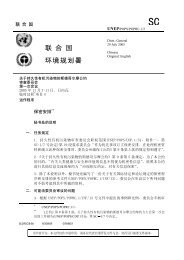United Nations Environment Programme - Stockholm Convention on ...
United Nations Environment Programme - Stockholm Convention on ...
United Nations Environment Programme - Stockholm Convention on ...
You also want an ePaper? Increase the reach of your titles
YUMPU automatically turns print PDFs into web optimized ePapers that Google loves.
4.3.7 Developing country c<strong>on</strong>cerns with respect to meeting BAT-BEP requirements, by<br />
Annex II of EGB-3 Report (Nairobi C<strong>on</strong>sultati<strong>on</strong>)<br />
Annex II of EGB-3 Report<br />
Annex II<br />
DEVELOPING COUNTRY CONCERNS RELATING TO MEETING BAT-BEP REQUIREMENTS,<br />
IN PARTICULAR, IN THE AREA OF MEDICAL WASTE, WHILE CONTENDING WITH OTHER HIGH<br />
PRIORITY SOCIO-ECONOMIC ISSUES.<br />
The developing country parties expressed with c<strong>on</strong>cern, the difficulties that may be c<strong>on</strong>fr<strong>on</strong>ting some of their<br />
member to meet the BAT-BEP standards for POPs in medical waste management due to lack of or inadequacy<br />
of capacity and technology while c<strong>on</strong>tending with other high priority socio-ec<strong>on</strong>omic issues. However, we<br />
recognize that medical waste may have to be disposed off in a manner that will prevent the spread of infectious<br />
diseases arising form the present practice of co-disposal of hazardous medical wastes with other domestic type<br />
wastes in the open dump. Therefore, in the absence of sufficient, timely and appropriate internati<strong>on</strong>al technical<br />
and financial assistance, developing country parties may have to be allowed in the short-term the use of the<br />
other opti<strong>on</strong>s which are better than open dumping, including small scale hospital incinerators, even if they are<br />
not BAT, even though many aspects of BAT and BEP guidance would still apply and still be useful, especially<br />
waste management measures including segregati<strong>on</strong>, and minimizati<strong>on</strong>. In this regard, there is need for early<br />
provisi<strong>on</strong> of financial resources for capacity building and instituti<strong>on</strong>al strengthening to enable compliance with<br />
BAT-BEP guidelines for POPs management by developing country parties. We note with interest the<br />
GEF/UNDP/WHO Medical Waste Management dem<strong>on</strong>strati<strong>on</strong> project under development, and we encourage<br />
the GEF, its implementing agencies and others to support and rapidly initiate much more work in this area. This<br />
would be greatly facilitated by developing countries making the related BAT/BEP issues and important part of<br />
their Nati<strong>on</strong>al Sustainable Development Strategies.<br />
The need for special assistance in meeting BAT and BEP requirements for medical waste management is<br />
indicative of broader c<strong>on</strong>cerns relative to implementati<strong>on</strong> of BAT and BEP for many developing countries.<br />
Implementati<strong>on</strong> of BAT and BEP must be made broadly compatible with sustainable development goals in<br />
order to encourage development and poverty reducti<strong>on</strong> while, at the same time, taking needed measures to<br />
protect public health and the envir<strong>on</strong>ment from POPs.<br />
70


